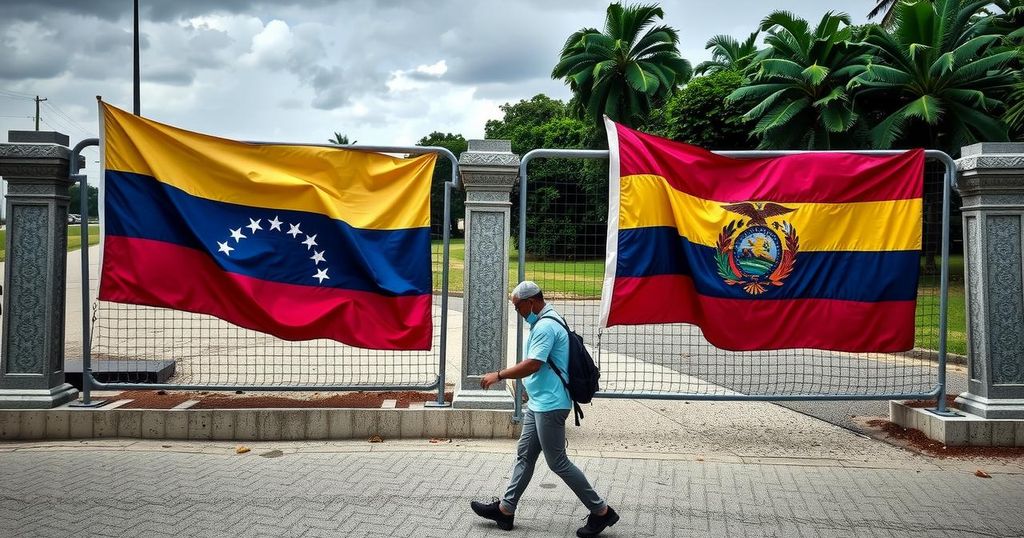Colombia has appointed Ambassador Milton Rengifo to attend Nicolás Maduro’s inauguration, despite President Gustavo Petro’s absence due to the election’s illegitimacy. Meanwhile, security measures along the Colombian border are heightened in anticipation of protests against the Maduro regime, which are expected to take place globally. The political tensions between Petro and Duque illustrate the ongoing complexities of the Colombian-Venezuelan relationship and the broader implications for democracy in the region.
Colombia has appointed its current Ambassador to Venezuela, Milton Rengifo, to attend Nicolás Maduro’s upcoming third-term inauguration in Caracas on January 10. This announcement comes from President Gustavo Petro, who notably will not be present at the event. He cited the illegitmacy of the July 28 elections due to blockades, and also criticized the arrest of Carlos Correa, leader of the NGO Espacio Público, as a significant reason for his absence. Despite potential backlash regarding Rengifo’s attendance, Petro emphasized the necessity of maintaining diplomatic relations, in contrast to former President Iván Duque’s approach, which he deemed ‘extremely brutal.’
The security posture along the Colombia-Venezuela border has intensified as Colombian authorities remain watchful of potential disturbances during the inauguration, particularly in areas known for FARC and ELN guerrilla activities. Even in the absence of specific intelligence alerts, Colombia has deployed 3,700 troops across various border sectors and established collaborative security frameworks involving multiple governmental offices.
Simultaneously, protests against Maduro’s regime are planned globally, including in Bogotá, where opposition leaders are calling for unification against perceived democratic violations in Venezuela. President-elect Edmundo González, who recently won a popular vote, is set to arrive in Caracas shortly before the inauguration, alongside nine former Latin American presidents, further heightening attention on the event.
Maduro’s government has publicly threatened those who accompany González, labeling them as fugitives for alleged conspiracy, indicating a tense environment both domestically and internationally.
The complex political dynamics between Colombia and Venezuela have intensified in light of recent elections and ongoing governance issues in Venezuela. President Gustavo Petro’s administration has opted for a diplomatic approach amid criticism, especially concerning former President Iván Duque’s policies, which advocated for stricter measures. The relationship is further complicated by the ongoing crisis in Venezuela, fear of violence during political events, and the growing anti-Maduro sentiments among Venezuelans and the international community. Diplomatic tensions have been exacerbated by frequent accusations of human rights abuses in Venezuela and concerns regarding political legitimacy, particularly surrounding Maduro’s election processes. Increased military presence along the border reflects Colombia’s response to safeguard against any potential spillover effects of Venezuela’s political unrest, maintaining readiness during sensitive periods. As Venezuelans prepare for protests globally, the involvement of Latin American political figures in Caracas adds another layer to the unfolding events, underscoring the broader regional implications of Venezuela’s political situation.
The designation of Ambassador Milton Rengifo to attend Nicolás Maduro’s inauguration reflects Colombia’s intent to navigate a tense diplomatic landscape while asserting its stance on human rights and democracy. President Gustavo Petro’s rationale for not attending underscores the contentious nature of Venezuela’s electoral legitimacy and the criticism he faces from political opponents like former President Duque. As Colombia fortifies its borders and prepares for potential unrest, the global demonstrations against Maduro signal a pivotal moment in Venezuela’s ongoing political crisis, with implications for regional stability.
Original Source: thecitypaperbogota.com






